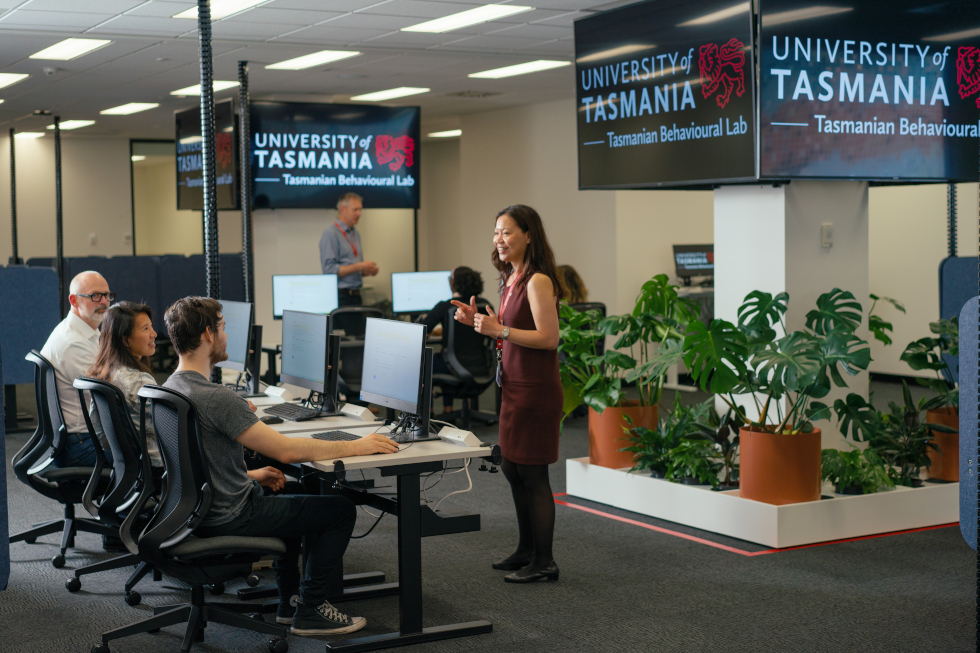The Road to Sustainability is Paved with Good Intentions – We Just Need to Act on Them
by Hobart Magazine

Sustainable living, exercising regularly, and saving money, all share a common barrier: while we might know these things are good for us, motivating ourselves to actually DO something can be a lot harder.
Even in the face of global climate change – and knowing what we need to do about it – it can still be hard to change our ways. But Professor Swee-Hoon Chuah, Director of the Tasmanian Behavioural Lab, said there were some very simple tricks we can all use to change our own behaviour.
“You can find ways to self-regulate your behaviour with little self-nudges, which make it easier to do the right thing and harder to do the wrong thing,” she said. “And another way is to turn it into a game, make it fun, make it appealing to do.”
The Tasmanian Behavioural Lab is the University of Tasmania’s dedicated institute for behavioural science education and research. Behavioural science blends elements of behavioural economics, psychology, and cognitive science to understand how people behave and make decisions. That knowledge can then be used to understand, predict and nudge people’s behaviour, to create better outcomes for themselves and for society. And it always starts at an individual level.
“Behaviour is most effectively changed from the bottom up, incrementally,” Swee-Hoon said. “Big change comes from many individuals all making small changes.”
According to Swee-Hoon, there’s good evidence that our society has reached a critical mass of people who understand the risks of climate change and who want to make changes and make a difference.
“What it comes down to is that gap between the intent and the action. Maybe it feels inconvenient, maybe you’re just a bit lazy. How do we make it easier for people to just do what they know is the right thing to do?” she said.
If you know what you should do but can’t make yourself do it, the solution might be to create a commitment mechanism to make the right behaviour easier – or even default – option. Think about who you want to be, and what “current you” can do now to make that easier for “future you.”
“A lot of people already do this with gym memberships: if they pay up front, they’re less likely to skip a visit, since they’ve already paid for it,” Swee-Hoon said. “If I want to eat less chocolate, current me can simply not buy it at the supermarket, knowing future me will be too lazy to leave the house and buy it when I’m craving it later. In terms of sustainability, it can take the form of turning the thermostat down a couple of degrees, knowing that leaving it there is easier than getting up to change it again.”
Another option is called ‘gamification’. There’s nothing quite like a Tidy Towns competition to suddenly make people more motivated to clean up litter. “Socially, people are quite competitive. We thrive on us-and-them tribalism, and comparing ourselves to other people.
“We harness that every time an office holds a 10,000 Step Challenge – suddenly everyone is motivated to exercise. So, find a way to make a game of it, motivate yourself as well as the people around you.”
And it works, on a small scale as well as large scale.
In 2015, an environmental group used gamification to tackle cigarette butt litter in a London street, using a glass-fronted bin, divided into two sections, with the question: Who is the best soccer player in the world? Ronaldo or Messi?
People cast their vote by putting their cigarette butt into the corresponding side of the bin and the glass front allowed everyone to see who was winning. Not only were people putting their own butts in the bin, but they were picking up others off the ground in order to skew the vote in their favour.
“All those little things add up,” Swee- Hoon said. “If every one of us does one thing, it’s enough to make a big difference. Start with the little things, inexpensive things, turn the lights off when you leave the room, and when that’s multiplied across lots of people, that’s when you get change.”
SMALL CHANGES ADD UP:
- Switch off the lights
- Take the stairs
- Shut your windows when the AC is on
- Take shorter showers
- Power down your laptop
- Unplug electronics you’re not using
- Turn the thermostat down a couple of degrees
- Do full loads of laundry
- Switch to low-energy lights.

